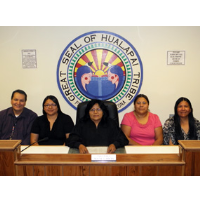Native Americans Win Right to Prosecute Non-Indians in Tribal Courts
 Hualapai Tribal Court (photo: Hualapai Tribe Website)
Hualapai Tribal Court (photo: Hualapai Tribe Website)
When the Violence Against Women Act is signed by President Barack Obama, it will mark an historic milestone for Native American tribes: for the first time, they will have the authority to prosecute non-Indians who do not live on tribal lands for crimes committed there. Under the Act, Indian tribes will be able to ask the Attorney General for certification that their tribal court system can exercise jurisdiction over non-resident, non-Indians charged with domestic or sexual violence that occurred on Indian lands.
In light of the depressing statistics—Native American women suffer a murder rate 10 times worse than the national average, and more than one in three will be raped at some point (double the rate for other ethnicities)—tribal leaders and women’s rights advocates argued t hat the change was needed to fill a gap in law enforcement. According to them, local police are often reluctant to investigate crimes committed on tribal lands for a variety of reasons, allowing non-Indians to abuse and rape Indian women with impunity.
The problem has its roots in the unique status of the Native American Nations under the U.S. Constitution, which recognizes their sovereignty as organic and not granted by the states where Indian lands are located. Because tribal sovereignty is limited, federal law refers to the tribes as “domestic dependent nations,” and a 1978 Supreme Court case held that one of those limitations was that tribal courts had no jurisdiction to try or punish non-Indians.
Republican critics of the bill contended that the expanded jurisdiction was unconstitutional, and that tribal courts would be unfair to non-Indian defendants. Sen. Charles Grassley (R-Iowa) said that “you got to have a jury that is a reflection of society as a whole, and on an Indian reservation, it’s going to be made up of Indians, right? So the non-Indian doesn’t get a fair trial.”
Rep. Doc Hastings (R-Washington) asserted that “In a tribal court, constitutional protections and the Bill of Rights do not apply. Under the bill, a non-Indian citizen tried in a tribal court has no right to appeal to a federal court, lacks the guarantee of due process, has no right to an impartial jury of one’s peers and more. A vote in favor of the bill was a vote to deny U.S. citizens their Bill of Rights.”
The National Congress of American Indians replied to these remarks by pointing out that the attorney general may certify a tribal court’s eligibility to prosecute non-Indians only “after…concluding that the criminal justice system of the requesting tribe has adequate safeguards in place to protect defendants’ rights.” In addition, the Indian Civil Rights Act guarantees the rights enumerated in the Bill of Rights to all those under the jurisdiction of tribal governments.
“This is a long-delayed and hard-won victory for millions of women in this country,” said Sen. Patty Murray (D-Washington), who estimated that at least 30 million more women—including Indians, lesbians, and undocumented aliens—will be eligible for help under the amended Act.
In a statement, Obama said that “Renewing this bill is an important step towards making sure no one in America is forced to live in fear, and I look forward to signing it into law as soon as it hits my desk.”
-Matt Bewig
To Learn More:
Tribes Win New Power to Prosecute Non-Indians for Domestic Violence (by Rob Hotakainen, McClatchy Newspapers)
NCAI Responds to Senator Grassley’s Video Comments on VAWA Tribal Provisions – “Fear Mongering” Must End (National Congress of American Indians)
- Top Stories
- Unusual News
- Where is the Money Going?
- Controversies
- U.S. and the World
- Appointments and Resignations
- Latest News
- Trump Renames National Football League National Trump League
- Trump to Stop Deportations If…
- Trump Denounces World Series
- What If China Invaded the United States?
- Donald Trump Has a Mental Health Problem and It Has a Name






Comments